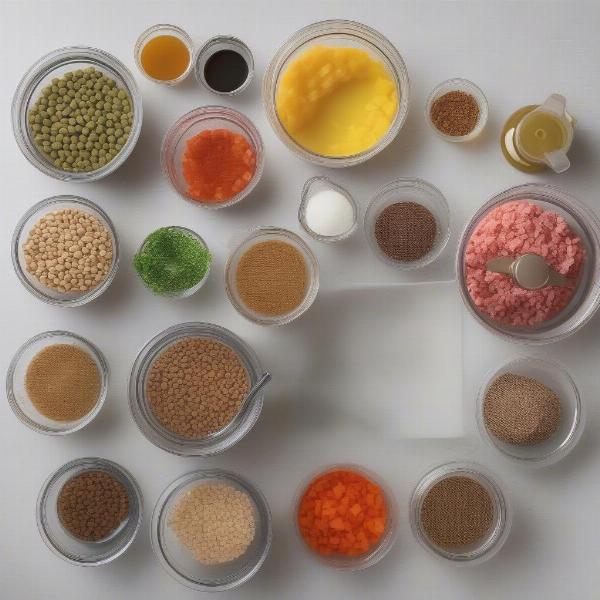While the “boz hot dogs schererville menu” search might lead some to believe it relates to dog food, it actually refers to a popular restaurant in Schererville, Indiana. Boz Hot Dogs is known for its delicious hot dogs and other fast food items – definitely not suitable for your canine companion! So, let’s put aside the human menu and focus on what should be on your dog’s menu. This article will guide you through providing your furry friend with the best nutrition possible.
Understanding Your Dog’s Nutritional Needs
Just like humans, dogs need a balanced diet to thrive. This includes proteins, fats, carbohydrates, vitamins, and minerals. However, the proportions of these nutrients differ significantly from our own needs. A dog’s diet should primarily consist of high-quality protein sources, such as meat and fish, which provide essential amino acids for muscle development and overall health. Healthy fats are crucial for energy and coat health, while carbohydrates offer a source of energy and fiber.
Choosing the Right Dog Food
The pet food market is flooded with options, making it challenging to choose the best one for your dog. When selecting a dog food, look for one that meets the Association of American Feed Control Officials (AAFCO) standards. This ensures the food provides complete and balanced nutrition for your dog’s life stage. Consider factors such as your dog’s breed, age, activity level, and any specific dietary needs or allergies when making your decision.
Dry vs. Wet Food
Dry kibble and wet canned food are the two most common types of dog food. Dry food is generally more affordable and convenient to store, while wet food is often more palatable, especially for picky eaters. Both types can provide complete nutrition, so the best choice depends on your dog’s preferences and your budget.
Grain-Free vs. Grain-Inclusive Diets
The debate surrounding grain-free diets continues. While some dogs thrive on grain-free formulas, others may benefit from grains in their diet. If your dog has a grain allergy or sensitivity, a grain-free diet is essential. However, for most dogs, high-quality grain-inclusive diets can provide excellent nutrition. Consult your veterinarian to determine the best option for your furry friend.
Homemade Dog Food: Is it Right for You?
Preparing homemade dog food allows you to control the ingredients and cater to your dog’s specific needs. However, it requires careful planning and research to ensure your dog receives a balanced diet. Consult a veterinary nutritionist to create a homemade recipe that meets your dog’s nutritional requirements.
 Preparing Homemade Dog Food
Preparing Homemade Dog Food
Foods to Avoid Feeding Your Dog
Certain foods are toxic to dogs and should never be given to them. These include chocolate, grapes, raisins, onions, garlic, macadamia nuts, and xylitol (an artificial sweetener). Avoid feeding your dog table scraps, as many human foods are high in fat and salt, which can lead to health problems.
Conclusion
Feeding your dog a healthy diet is crucial for their overall health and well-being. While searching for “boz hot dogs schererville menu” might have brought you here, we hope you’ve gained valuable insights into canine nutrition. By understanding your dog’s nutritional needs and choosing the right food, you can help them live a long, happy, and healthy life.
FAQ
- How much food should I feed my dog? The amount depends on factors like age, breed, size, and activity level. Check the dog food packaging for guidelines or consult your veterinarian.
- Can I give my dog treats? Yes, but treats should only make up a small percentage of your dog’s daily calorie intake.
- What are the signs of food allergies in dogs? Common signs include itching, skin rashes, digestive upset, and ear infections.
- How often should I feed my dog? Most adult dogs do well with two meals a day.
- What should I do if my dog is a picky eater? Try switching to a different flavor or texture of food, or adding a small amount of warm water or low-sodium broth to their kibble.
- Is it okay to switch dog food brands? Yes, but do it gradually over several days to avoid digestive upset.
- When should I switch my puppy to adult dog food? Most puppies can transition to adult food around 1 year of age.
Introducing ILM Dog
ILM Dog, your trusted resource for all things canine, offers expert advice on dog breeds, health, training, nutrition, grooming, and much more. From puppy care to senior dog care, we provide practical, reliable information for dog owners worldwide. Whether you’re a seasoned dog owner or just starting your journey, ILM Dog is here to support you every step of the way. For expert advice on dog nutrition, explore our articles on choosing the right dog food and understanding your dog’s dietary needs. Contact us at [email protected] or +44 20-3965-8624 for personalized guidance.